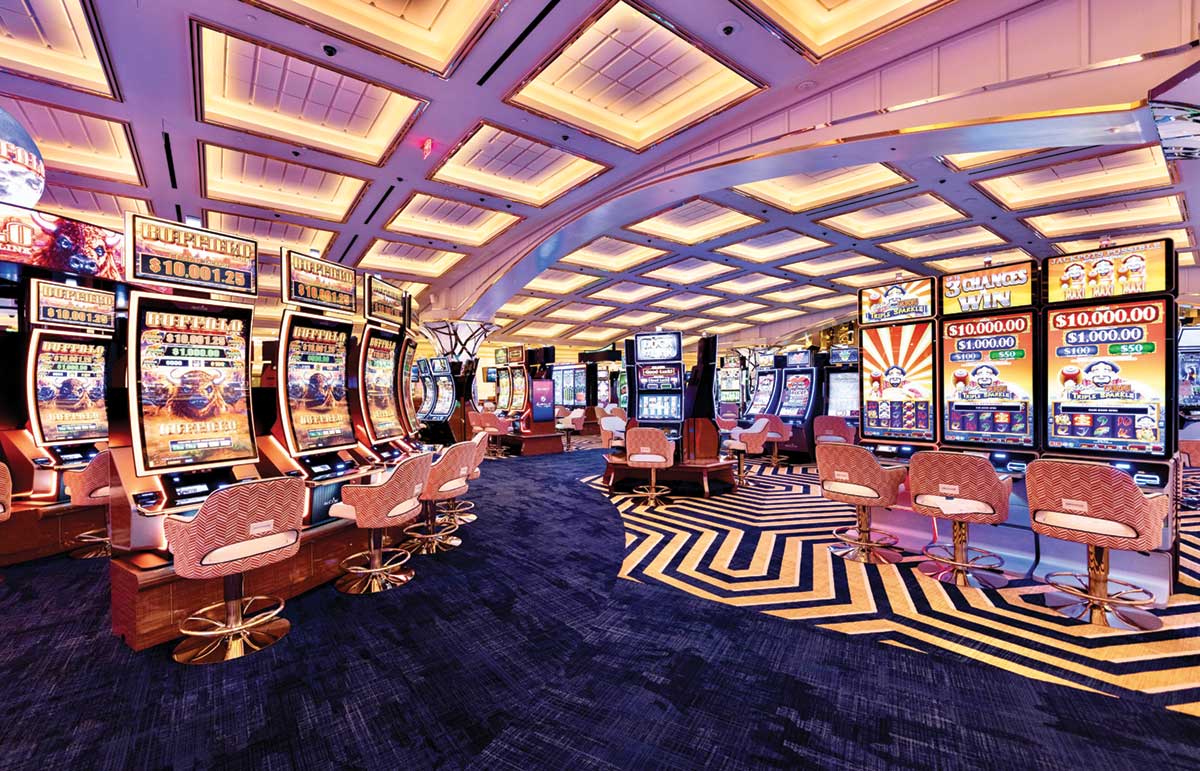With all eyes on a digital future, the global COVID-19 pandemic has highlighted the increasing need for today’s IR operators to diversify the manner in which they provide their entertainment offerings.
Even before the global pandemic struck, the conventional IR business model was in need of revision to remain viable and keep pace with development of the digital economy. The events of the past 18 months have accelerated this pivotal change towards digital service delivery across the business sector.
With forced closures during lockdowns, overall reduced footfall and limited in-person marketing, the over-reliance of the IR industry on traditional property revenue streams has come to the fore. The need for alternative channels of customer engagement has become clear, as has the need for diversification of business activities into new digital sectors to leverage the growing digital entertainment market.

The IR model itself appears to be at a turning point. The offline property-based format is poised to be superseded by a new structure, in which IR operators emerge as entertainment platform providers, offering online to offline services throughout the customer journey at home and in resort.
The key to success lies in creating a platform ecosystem with a combination of selected digital and physical assets, alongside strategic entertainment and content partners. The target portfolio encompasses remote gaming, online sports betting, e-gaming, resort casinos and in-market entertainment providers. Operators will thereby be in a position to offer end-to-end service delivery for all gaming and entertainment needs, maximizing cross-selling opportunities across the platform to existing user bases and increasing share of wallet and platform stickiness, at all times and wherever the customer is located.
REDEFINING THE IR MODEL
The present business environment has been a catalyst for change. In Chinese, the word for “crisis”, (wēijī), is formed from the symbols for “precarious” and “pivot”. In every crisis, there is a place for change. Over the past 18 months, consumer behavior has overwhelmingly shifted to digital channels.
IR operators were initially caught on the back foot, lacking the capabilities and regulatory framework to transition to an online presence, which businesses in other sectors, notably retail, education, finance and administration, were able to do. Faced with these challenges, a re-evaluation of the IR model was needed in today’s entertainment world which is dominated by on-demand experiences and online availability.

Recognizing the problems associated with a siloed “resort-only” product, the solution is to transform the business into an entertainment platform that spans across the value chain, servicing customers at home and in resort destinations for both gaming and non-gaming entertainment demands. For many operators, this signifies an expansion of the business portfolio with new acquisitions and partnerships into online activities, as well as investment in digital capabilities, in order to provide an integrated customer experience across the new entertainment platform.
ON-PROPERTY CROSS-OVER TECHNOLOGIES
From an operations perspective, digitalization of the existing on-property product and service offering is paramount for a more versatile and agile service delivery that tracks customers’ changing leisure preferences. As a first step, online live streaming of play at physical tables via a resort mobile app offers a convenient choice for customers on property to continue playing wherever they are located – in room, in restaurants or by the pool. Advances in technology and improved streaming quality allow for customized user features, interface languages, table limits and interaction with favorite live dealers.
The live streaming solution could also potentially increase gaming capacity, particularly at low limit tables. These digital service delivery options are especially necessary to attract the younger, tech-driven generation who engage almost exclusively in digital forms of entertainment. These Generation Z consumers expect digital content and instant-play options, which on-property live streaming solutions could deliver.
Traditionally, operators have been licensed to offer gaming within designated areas, with entry restrictions and robust surveillance infrastructure implemented in order to prevent fraud, money laundering and under-age play. Technology now exists, in the form of online identity verification portals and facial recognition technology, to reliably complete KYC and age verification checks remotely. Many of these online compliance tools are employed by operators in the online gaming industry to meet regulatory requirements, and there would seem scope for adoption by IR operators in order to launch on-property mobile app and streaming channel products.
 The concern that on-property mobile gaming would somehow cannibalize casinos’ revenue also appears unfounded. Firstly, there is the possibility to segment game distribution, introducing new game concepts that are only available in the online mobile app, and others which are only available at machines on the gaming floor.
The concern that on-property mobile gaming would somehow cannibalize casinos’ revenue also appears unfounded. Firstly, there is the possibility to segment game distribution, introducing new game concepts that are only available in the online mobile app, and others which are only available at machines on the gaming floor.
Secondly, the online user experience is wildly different from the in-person experience. Mobile caters to diverse preferences and does not attempt to replace in-person attendance on the gaming floor, which stimulates a different set of customer emotions. Instead, as live streaming of music concerts and physical concert attendance shows, the two methods are entirely complimentary and work together to keep audiences engaged and connected to the brand longer, wherever they are situated.
As IR operators start to roll-out new mobile apps for the next-generation of digital CRM solutions – Resorts World Las Vegas launched a cashless wagering and resorts services app upon opening in June – the addition of a live streaming and on-property betting function within the app could be a logical development, pending the relevant licensing approvals.
REMOTE GAMING POSSIBILITIES
A clear advantage of pure mobile gaming is the ability to engage with customers whether they are situated on-property or in their home market. Regulatory and jurisdictional complications abound, however, where operators and patrons reside in different jurisdictions and effectively prevent cross-border gaming via digital platforms. US regulators have shown greater awareness of the potential benefits of online casino gaming, with the states of Pennsylvania, New Jersey, Delaware, West Virginia and Michigan legislating for online casino activities, and most recently, the Nevada Gaming Control Board tabling a hearing in May 2021 to review the ability of IR operators to offer full online casino gaming in future and remove the requirement for in-person registration for mobile betting accounts.

In Asia, the Philippine Amusement and Gaming Corporation (PAGCOR) has historically licensed offshore gaming operators that provide online gaming by foreigners located outside the Philippines. In the past year, PAGCOR has issued the first online gaming licenses that also permit online gaming by domestic players in the Philippines. The first license was granted in December 2020 to DFFN’s Inter-Active Entertainment Solutions Technologies Incorporated for its new remote gaming platform, InPlay, which is an extension of its land-based system, allowing remote gaming from off property locations. The feature is only available, however, to VIP players who meet strict eligibility, KYC and registration requirements and implement on-property fund deposit and withdrawal.
Meanwhile, Okada Manila’s operator Tiger Resort, Leisure and Entertainment Inc was successfully granted a license to offer online table and machine gaming to its customers in April 2021. Okada Manila thereby became the first IR operator in Entertainment City to offer online gaming, and this may provide a model for similar operators to follow in the country. Certainly, the capability to switch between on-property and online service delivery to the same target audience is reassuring for businesses and revenue forecasts when travel restrictions and in-person visitations remain unpredictable in the current environment.
While the Philippines has legislated for online gaming, the position to allow for the introduction of online gaming in Macau is still under review. In April 2020, the Chief Executive of Macau, Ho Iat Seng, iterated that the government was still studying online gaming as a potential method for economic diversification in the gaming sector, and the public policy implications of allowing such activities had to be considered.
DIVERSIFICATION OF BUSINESS MODEL – SPORTS WAGERING AND DIGITAL GAMING ACQUISITIONS
While regulatory considerations dictate the possibilities for IR operators to expand organically into online casino gaming, the acquisition of sports betting and online gaming businesses is a strategic move towards digital diversification of IR asset portfolios. The synergies between the core businesses are evident in terms of common user bases and the potential for cross-marketing of gaming services to increase the company’s share of wallet from the same patron pool. Hence, the addition of sports betting and wagering divisions can help IR operators present a more complete gaming offering to customers and enable patrons to remain on the same platform for all wagering activities.
Targeting this objective, Caesars Entertainment completed the acquisition of the UK sports bookmaker William Hill PLC in April 2021 and announced that William Hill members would subsequently have access to the highly successful Caesars Rewards loyalty program, earning tier status that is recognized at Caesars’ physical and online properties. Meanwhile, Caesars’ members benefited from the addition of sports betting and online gaming products available through a single unified Caesars wallet. Caesars also recently secured a deal with Prophet to make the sports betting exchange’s peer-to-peer sports-wagering network, betprophet.co, available in New Jersey in advance of the 2021 NFL and College football seasons.
 The advantages have not been lost on other IR operators, with Bally’s Corp’s purchase of the sports betting technology company Bet.Works in November 2020, as well as MGM Resorts’ attempted take-over of sports betting and online gaming group Entain, which was abandoned in January this year. With a finite number of targets available for IR operators to consider, some may also look to partner with sports betting technology companies simply to host sportsbook betting platforms and kiosks within their venues, as illustrated by IGT PlaySports’ tie up with Resorts World Las Vegas and WynnBET Live’s collaboration with Scientific Games.
The advantages have not been lost on other IR operators, with Bally’s Corp’s purchase of the sports betting technology company Bet.Works in November 2020, as well as MGM Resorts’ attempted take-over of sports betting and online gaming group Entain, which was abandoned in January this year. With a finite number of targets available for IR operators to consider, some may also look to partner with sports betting technology companies simply to host sportsbook betting platforms and kiosks within their venues, as illustrated by IGT PlaySports’ tie up with Resorts World Las Vegas and WynnBET Live’s collaboration with Scientific Games.
A further strategy for digital diversification is the acquisition of digital gaming companies that operate in the B2B market. Most recently, Las Vegas Sands last month announced the establishment of a new digital gaming investment team that will focus on portfolio investments in businesses that are developing digital gaming technologies for the enterprise sector. With the overwhelming conversion of service delivery to online channels, this is an area that stands to see significant growth going forwards.
SPORTS WAGERING MARKET IN MACAU
Nearer to home in Asia, the sports betting sector in Macau has been dominated by one entity, Macau Slot Co Ltd, which has held a prima facie monopoly and the sole concession for online and retail sports betting in football and basketball since 1998. However, as of the latest renewal of Macau SLOT’s concession contract in June 2021, the conditions stipulate that the new three-year license which expires in 2024 is non-exclusive. This development opens the window for new operators to enter the sports betting market in Macau, upon successful grant of license.

Interest in this may come from the existing IR operators in Macau as they look to broaden the scope of their activities and entertainment platforms in the SAR. The Las Vegas casino sportsbook market certainly provides an attractive model to emulate, especially as Macau itself looks to play host to more high-quality professional sports events from around the region in future.
INTEGRATED ENTERTAINMENT PLATFORMS
For IR operators to successfully transition to becoming integrated entertainment platforms, a further necessary component is the presence of in-market entertainment assets or partnerships. These primarily act as brand-building and customer engagement tools, which are especially crucial in markets such as China where all onshore marketing for gaming is prohibited. Accordingly, Melco International recently announced a partnership with Chinese developer Agile Group Holdings to establish an RMB4 billion (US$617 million) non-gaming entertainment complex in Zhongshan, China with mixed use including residential, entertainment and hospitality. The new complex will feature hotels, shopping centers and a theme park, providing a strategic presence in an important feeder market and a vital component of the IR operator’s end-to-end entertainment platform.
We may also see more joint ventures and collaborations with leading in-market leisure and consumer entertainment companies to develop digital content and experiences for brand awareness and consumer engagement, especially while frequent international travel remains limited in the short term.

As IR operators overhaul their business model and attempt to equip themselves with the necessary digital and entertainment assets to meet the new leisure economy, effective integration will be critical to realizing the full potential of the platform-based approach to service delivery and revenue generation. Venturing into new digital gaming and entertainment streams will require knowledge and expertise of new sectors, but the success of the IR model has always hinged on the ability to integrate, and this once again constitutes the core challenge which the industry’s operators must master.

































